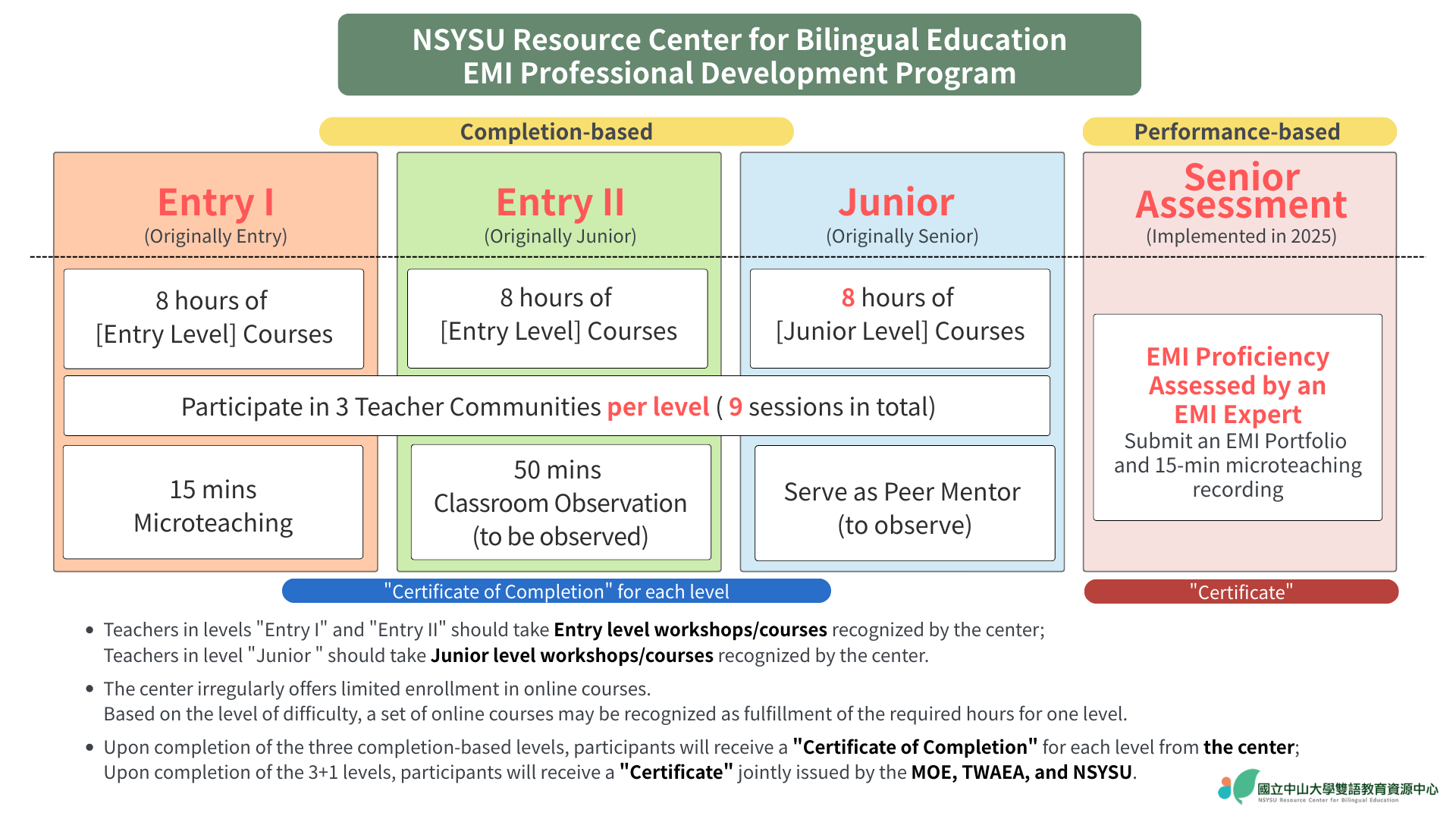Descriptions of the EMI Professional Development Program, NSYSU

+ Developments of the Program
Since 2021, NSYSU has launched an EMI Professional Development Program, with the aim of developing teachers’EMI instructional skills and competencies through three levels of training (Entry, Junior, and Senior) and three components in each level: Professional Development Workshops, Teacher Community, and Teaching Practice. Upon fulfilling the requirements of each level, participants will receive a Certificate of Completion issued by the NSYSU’s Resource Center for Bilingual Education.
“Professional Development Workshops” are designed to support teachers in transitioning both their instructional language (from CMI to EMI) and pedagogy (from teacher-centered to student-centered), and facilitate the development of effective EMI teaching practices that suit their teaching styles. “Teacher Communities” focus on building a network of peer support. Unlike traditional lectures, Teacher Communities emphasize peer-to-peer exchanges of experiences and practices, in boosting teachers’confidence and knowledge in EMI contexts. “Teaching Practices” vary for the three levels: a 15-minute Microteaching demonstration, a 50-minute Classroom Observation (to be observed), and acting as Peer Mentor to observe and provide feedback to peers. These activities encourage teachers to implement the newly acquired skills in their classrooms.
Starting from the 113 academic year, the MOE has commissioned the Taiwan Assessment and Evaluation Association (TWAEA) to implement a national certification process to ensure the quality of EMI training programs at the six designated Bilingual Education Resource Centers—NTU, NTNU, NTUST, NCHU, NCKU, and NSYSU. This certification requires EMI training programs to include at least 36 hours of training and a 15-minute EMI Microteaching assessment, conducted entirely in English.
In alignment with TWAEA’s certification requirements, NSYSU has revised its EMI Professional Development Program starting in 2025. The previous three-level structure has been updated to 3+1 levels, referred to as the current structure(with the previous referred to as the previous structure). Participants who complete all requirements under the current structure will receive a Certificate jointly issued by the MOE, TWAEA, and NSYSU.
To facilitate this transition, NSYSU has designated January 31, 2025 (the end of the 113-1 semester) as the cut-off point between the previous and current structure. Participants who have not obtained a certificate under the previous structure by this date will be subject to the current structure’s requirements. Details regarding the transition measures, including how to fulfill any outstanding hours for Professional Development Workshops or Teacher Community (TC) sessions, are outlined in the following section.
| Current Structure | Previous Structure | |
| Time | Effective from February 1, 2025 | Implemented until January 31, 2025 |
| Levels | 3 levels (Entry I, Entry II, Junior) + 1 level (Senior) |
3 levels (Entry, Junior, Senior) |
| Certificate and Issuing Authority | Certificate jointly issued by the Ministry of Education (MOE), Taiwan
Assessment and Evaluation Association (TWAEA), and NSYSU. |
Certificate of Completion issued by the NSYSU Bilingual Education Resource Center. |
| Workshops | Total of 24 hours: Entry I (8 hours, Entry level Workshops) Entry II (8 hours, Entry level Workshops) Junior (8 hours, Junior level Workshops) Courses may be taken concurrently, but Entry level workshops cannot be counted in the Junior level, and vice versa. |
Total of 20 hours: Entry (8h), Junior (8h), Senior (4h) Three levels each have their own different workshops. |
| Teacher Communities (TC) | Teachers must attend 3 sessions per level, totaling 9 sessions. | Only 3 sessions were required altogether; participation was not required for teachers taking online EMI training. |
| Teaching Practices | Entry I: 15-minute Microteaching by video recording, the Center will assign peer mentors to provide feedback.
Entry II: 1 Classroom Observation (to be observed) cannot be done simultaneously with Microteaching. Can be done concurrently with Peer Mentoring Junior: Peer Mentoring, to be paired up with a peer and take turns observing each other. Eligible after “20 training hours + 6 TC sessions + completed Microteaching.” *Teachers invited as Pilot Teachers or Peer Mentors by NSYSU may be credited toward Peer Mentoring. |
All Teaching Practices may be conducted at the same time. Pilot Teachers' or Peer Mentors‘ observations were noted and logged into Peer Mentoring records. |
| Senior level Assessment | Eligibility: Complete all requirements for Entry I, Entry II, and Junior levels, and receive the 3 Certificates of Completion. Submission of a portfolio: Participation records, reflective writing, assignments or assessments used in EMI, etc. Content and Rubrics of the Senior level Assessment An additional 15-minute unedited EMI teaching recording, in which teacher-student interaction must be observed. The recording will be evaluated by 2–3 experts assigned by the Center. Teachers who obtained all three certificates under the previous structure before January 2025 should still fulfill the 24-hour training and 9 TC session requirements before applying for the Senior Assessment. |
N/A |
| Notes |
●Teachers who have not received any Certificates of Completion under the previous structure by January 31, 2025, will be automatically transferred to the current structure. ●Records of Workshop, TC, and Teaching Practice records accumulated before 2025 may be carried over to the current structure. ●Online EMI courses offered by the Center will now be recognized based on difficulty and credited as either Entry or Junior level Workshop hours. |
|
